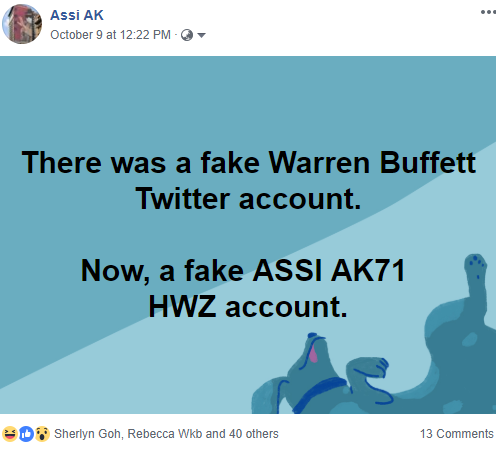2) Young working adult with little or no fiscal discipline. Same long term plan.
Some very clear guidelines there as to when ILPs might make sense. Now, Gabriel wonders "if there are any ILPs which have beaten the STI index returns? Or has any ILP beaten the highest unit trust returns?"
ILPs refers to the policy not the fund. So I would suppose the reader means the ILP fund. ILP funds are the same thing as Unit Trusts. There is also no sense talking about ILP funds beating Highest UT returns, as they maybe from different sectors, regions or asset type. There is no sense comparing any fund to STI, if the fund is not bench-marked against STI. A China/India ILP beating STI returns says nothing for the fund.
So allow me to re-phrase the question. Is there any difference between ILP funds and Unit Trusts? Has ILP funds beaten their index?
NTUC Singapore equity invests 60%+ into STREETTRACKS STRAITS TIMES INDEX FUND, and manages the remaining portion. See that they just slightly outperformed STI (mainly due to reinvested dividends). Some attribution perhaps to Dollar-Cost-Averaging.
AXA Fortress A Fund has consistently outperformed STI in fact by a large margin. Some impact may be due to dollar cost averaging, but most of it because of the capable fund manager: First State Investments Singapore.
Finally Aberdeen Singapore is a pure UT. So AXA ILP outperformed, but NTUC ILP underperformed pure UT.
I have many research on this area... working on another ebook... akan datang.
AK: Another e-book? I am sure you will be keeping me in the loop. Next, Lee Jiahui is "interested to know the market players income/revenue distribution/proportion of ILP products vs the traditional products".
BY: Unfortunately, there is no public data about this.
AK: OK, that was a fast one. Next person on the line is Derek Lim and he asks "What is your timeframe in holding a ILP? Is there a maximum age where you would advise against buying a ILP? Do you cutloss or do a fund switch if your ILP is doing badly? Similarly if your funds has done well, how do u lock in your gains? How do u balance between investment and coverage e.g. should I strive for minimum coverage and maximum investment?"
BY: Insurance charges rise exponentially after 55. So my time-frame is to cut at 55 if I'm holding to one (provided you have adequate cover from other policies). Anything above 50 is mis-selling. Any starts of regular premium ILP above age 40 is not cost-effective.
Cut-loss have to benchmark with buy term invest the rest to decide. In general most comparison will lead to the conclusion that BTIR is better. No manner of fund switching will solve the rising insurance charges problem.
AK: "Similarly if your funds has done well, how do u lock in your gains?"
BY: Same with UTs, if some funds have "done well", you can choose to switch into bonds to lock it in. However you give up any potential upside. You can also switch into funds that have been beaten down severely, and buy them at a low price. This is one of the strategies that I teach investors who have little time to manage their UTs.
How do u balance between investment and coverage e.g. should I strive for minimum coverage and maximum investment?"
If ever I'm forced into an ILP, I will go for Maximum cover, min investment, and terminate before 55. If you are going for investment, forget about ILPs with "some" insurance coverage.
AK: So, I repeat, go for maximum cover, minimum investment and terminate before turning 55. Derek, I hope you are taking down notes. Next, Talen Blackburn Terence asks whether "ILPs are better than buying shares directly? Which are the better ILPs? What percentage of our salary should we invest in ILP? what % of our portfolio should be in ILP?"
BY: ILPs and UTs cannot be compared with direct shares. Totally different issue. To invest in shares, you will need: (1) some time, (2) a reliable method (e.g. Value Investing, GAARP, etc) (3) that works for your psychology (4) and accumulate experience over at least one complete cycle beating the STI index. If stocks work for you, stay with stocks. The only reason why some stock investors work with us, is to access bond funds. If you are not a good stock investor, you can consider UTs.
ILPs are same as UTs. So I rephrase the question: Which are better UTs? Answer: Whatever that's going to make good money for you in the next 5 years. If I had a crystal ball, I'll let you know.
What am I saying? "THERE IS NO SUCH THING AS THE BEST OR BETTER UT or ILP". You need a strategy to make some money in UTs.
What percentage of our salary should we invest in ILP? what % of our portfolio should be in ILP?
None preferably, if he's talking about ILPs.
AK: Brendan, if you manage to get a crystal ball that works, let me know. I only have a bowling ball and it is not very cooperative most of the time. Here is another question from Gabriel, "why are ILP costs so high while the returns are non-guaranteed? Are there any upsides at all for holders of ILP?"
BY: There is no why... That's how they are structured. The only remote upside I see compared to BTIR, is that term has a specific expiry date, ILP doesn't. Example you have a term cover till age 65 thinking you'll not need it when children are all grown up. If you had an ILP instead for the same cover, you can CHOOSE to continue beyond 65. Say you already have an early stage of Cancer, before 65. It might be a good idea to continue coverage ...
Having said that, if you design your insurance portfolio well, you should have some other option to fall back on like a 99-year Critical Illness cover or a Living-type Policy.
AK: That is a good point on how ILPs might be a positive for certain people. OK, The next one is a biggy or several biggies from long time reader, Jimmy Ng. Buckle up or you might fall off your seat. Here comes the first question, "Why are distribution cost & expenses so high that it take a very long time (i.e. over a decade), on projections of guaranteed & non guaranteed, to break even, let alone generate positive returns?"
BY: There is no why... That's how they are structured. Insurers have costs. They calculate that this is how they can still make some profit after giving out commissions.
Instead of asking why, just compare the alternative and make a decision.
(1) Can I afford not to be insured? If Yes, at least have a good hospitalization plan. If you cannot afford not to be insured, but you still don't want any: eat healthily, exercise, hope you don't have bad genes and pray.
(2) If you want to insure adequately, use a competitive term insurance to cover Family Dependency Needs, and a Living or 99-year term to cover Critical Illness. Compare this option with ILP if you must.
AK: Is there any low expense version of ILP ?
BY: Not significantly. Even the cheapest may not compare well with BTIR. Between insurers, ILPs can differ A LOT!
This was from The Straits Times:
AK: In the Singapore context, can the ILP gives similar or better returns than CPF OA & SA ?
BY: ILPs = UTs. Yes, if the market allows. Yes, it you hang on to it for 20 years. Yes, if you employ a good strategy. No if you choose the wrong fund. No if you are expecting it to do wonders within 3-5 years.
AK: Will it be street smarter to buy a term policy getting the same mortality coverage of ILP and invest the rest into ETF or REITs or AK Investment fund (Jimmy's words, not mine)? My feel is that the returns from these investment could generously help to pay for the term insurance cost, do you agree ?
BY: Yes, generally speaking. Still... shop around. Term insurance rates can differ by 20%.
AK: What determines the Premium Allocation, Insurance Charges, Policy Fee & Funds Bid-Offer Spread ? Are these charges fair to policy holders or could be significantly reduced ?
BY: Let's not visit the fair issue again... The market will drive charges. One insurer cuts Bid-Offer spread or Premium allocation and comes up with a super competitive product, the rest will have to change soon. The Law of Economics will take care of excessive profits.
AK: What can be done to reduce the premiums & expense payable while increasing the coverage and ROI ?
BY: Nothing. Make a decision: (1) Cut-loss, replace with BTIR or (2) decide to hold and surrender before 55. Increasing Coverage and ROI cannot happen at the same time. It's either one of the other.
AK: Brendan, you have answered all of Jimmy's questions but we are not quite done yet. Just a few more questions from other readers to go. Elvin wants to know "If I suck at money management and am not savvy.. Is the ILP the right product for me? Does the ILP give me a peace of mind in terms of financial protection and is my capital guaranteed while receiving coverage? Are there embedded risks in ILPs?"
BY: If you suck at money management, go and learn. No one will be more responsible about it than you. If you REALLY cannot manage, and have poor fiscal discipline, then maybe you'll be better with ILP off than nothing at all. Risk are the market risks, capital non-guaranteed. If you want some guarantee, buy 99-term or a traditional living plan.
AK: Next, Kenji asks "how do u make money from ilp when u r in a losing position now?and is switching fund the only way?"
BY: If you are talking about a Single Premium ILP, meaning it's not a monthly or yearly premium plan, then SELL the ILP, buy an equivalent UT or in a potentially better one. You'll recover it faster because of the ILP charges.



































